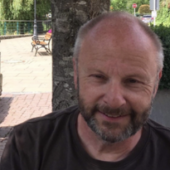
OLAMUR: low-trophic offshore aquaculture in Nordic multi-use contexts
OLAMUR: low-trophic offshore aquaculture in Nordic multi-use contexts
Øivind Bergh, Senior Scientist, Institute of Marine Research, Norway

OLAMUR: low-trophic offshore aquaculture in Nordic multi-use contexts
Øivind Bergh, Senior Scientist, Institute of Marine Research, Norway
About the speaker:
Dr. scient in General Microbiology (1996) Senior Scientist at the Institute of Marine Research, Coordinator of the EU project OLAMUR. Bergh has previously coordinated the EU project COEXIST (2010-2013 and been partner in several projects, notably AQUASPACE, CERES, MERMAID and CORDiNet. About 100 peer-reviewed publications, primarily on aquaculture, environmental interactions and disease control.
Company info:
The Institute of Marine Research is Norway´s largest and Europe´s second largest marine research institute, with about 1100 employees. Activities cover around fisheries, marine environment and aquaculture. Through its research and advice, the IMR seeks to help society to continue exploiting the valuable assets in the sea sustainably. They are a neutral knowledge provider, and they publicise our research results both in Norway and internationally.
The IMR is affiliated to the Ministry of Trade, Industry and Fisheries, which provides around 40% of funding. The rest of the funding comes from external research grants.
Vision: Knowledge and advice for rich and clean marine and coastal areas.
Ambition: They will be an international leader in marine research and advisory services.
Values: All their work must be based on integrity, creativity, interaction and respect.
Social mission: The Institute of Marine Research will be a leading supplier of knowledge relating to the sustainable management of the resources in marine ecosystems and the whole food chain from the sea to the table.
Presentation:
The OLAMUR, a Flagship project with 25 partners in 8 countries, is solving key bottlenecks hampering the development of sustainable large-scale low-trophic aquaculture in Europe, with focus on multi-use concepts with offshore windfarms and fish farming. The project is establishing three major case studies in the Baltic and North Sea, in Estonia, Denmark and Germany. The project works towards climate neutrality and circular economy, and is a part of the EU Mission Restore Our Ocean and Waters 2030.